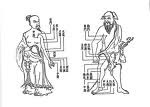What is the fundamental difference between Western and Eastern medical approaches? What is the philosophy of Traditional Chinese Medicine? The picture below simply demonstrates the basic tenets of each.
On the left side, we see the western model. Its is grounded in Cartesian philosophy, which separates mind and body. In this model, the body is seen as a machine, broken down into distinct parts. Western medicine requires specialists to tend to each part rather than the whole body. If a part is broken, it is fixed or removed, and may be replaced. The focus is on treating the patient after illness has taken hold. Western medicine is particularly helpful in managing acute injuries and emergencies.
The Eastern approach to medicine is pictured on the right. Here we see the human body as a garden, an ecosystem where all parts contain and affect the whole. Traditional Chinese Medicine is rooted in Taoism, and sees the body as a microcosm of the universal macrocosm. Just as a garden is affected by the environment, so to are our bodies. In Chinese Medicine, there is a fundamental principal called "yang sheng," which means "nourishing life." Here, the interior environment is of utmost importance and physicians were historically paid for keeping patients well rather than treating sickness. There's a Chinese adage that is often cited- "Don't dig a well when you're thirsty!" The goal in Eastern medicine is to nourish the body and mind, establishing harmony so that it is resistant to disease. It is only when the body is out of balance that disease can arise.
Of course, perfect harmony is difficult to attain and maintain, so Chinese medicine also intervenes to address imbalances in the body and mind, with the understanding that each part of the body is connected and effects the whole. Acupuncturists look at the constellation of signs and symptoms that a patient presents with to determine the pattern and root cause of their particular condition. The approach is to treat the fire (root cause) rather than the smoke (symptoms), and bring the body back into balance.






No comments:
Post a Comment